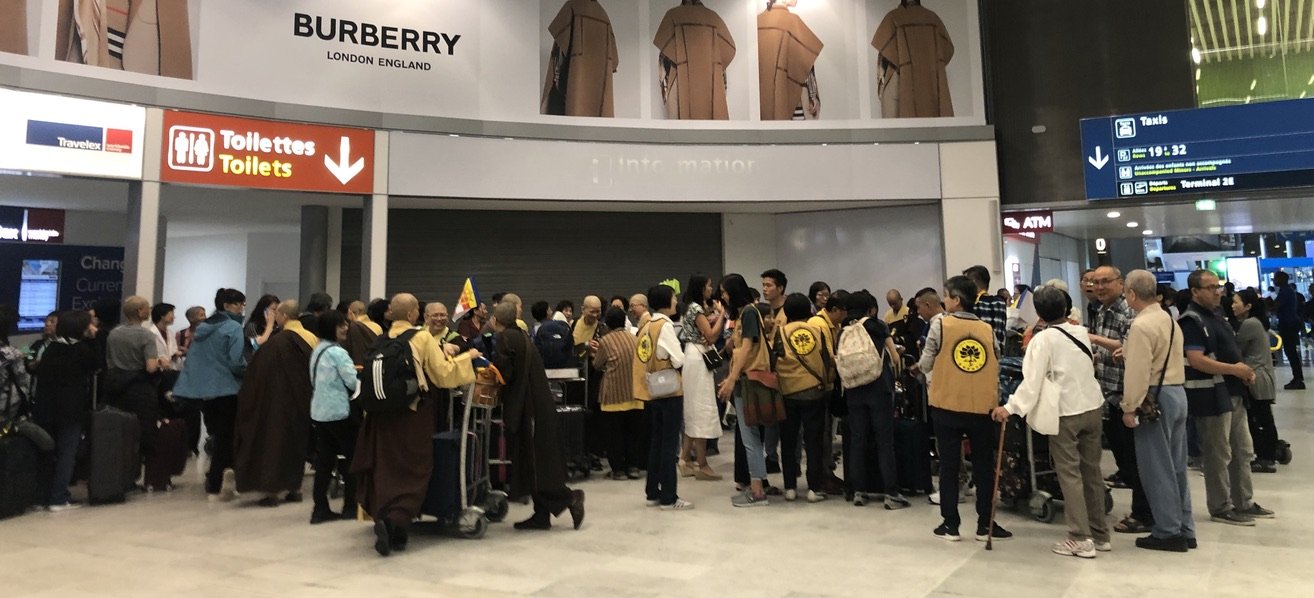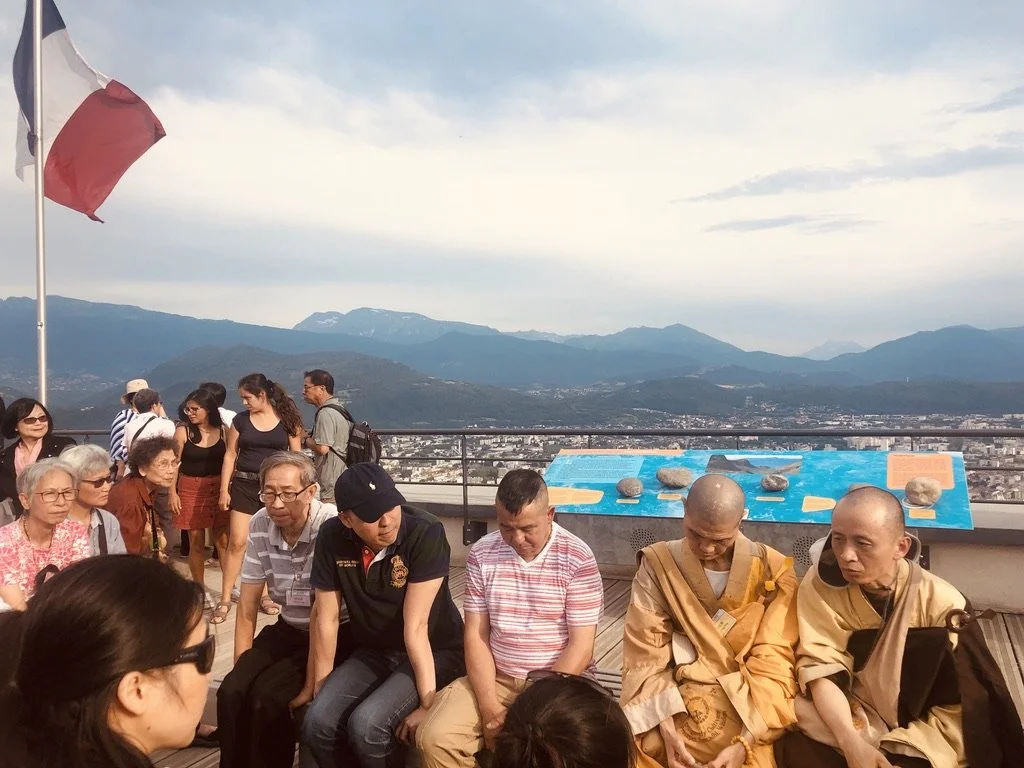Repentance Ritual of the Emperor of Liang in Grenoble, France
All Buddhas, Bodhisattvas, Venerable Master, Dharma Masters, wise teachers, and Dharma friends: good evening. My name is Thao Amanda Phi. This fall begins my sixth year working at Dharma Realm Buddhist University, but it feels like I've been part of this community for lifetimes.
I wanted to start my Dharma talk tonight with a line that is commonly repeated in the Repentance Ritual of the Emperor of Liang.
"Today, we are here in this Bodhimanda due to our shared karma."
Last summer a woman from China shared a reflection at the end of spending a week together at Buddha Root Farm. She made the comparison of how people who use the same ferry to commute to work have shared karma and affinities; how much more the affinities when we spend a week together cultivating?
Her analogy resonated with me deeply. It made me think of how much more affinities we must have with each other to all be dedicated to the Dharma that we choose to center our lives at or around CTTB. We must have been doing this for lifetimes.
About a month ago, I came back from Europe. The last time I spoke in the Buddha hall was three year ago, also when I came back from Europe. The experiences were both similar and completely different. When I went to Europe in 2016, it was for an academic seminar. This year, it was to be part of the DRBA France Delegation. Both experiences brought me back ready and willing to be a better human being.
From living in CTTB, I began to feel more comfortable practicing different Dharma doors. Working at DRBU and being in the community gave me the opportunity to try different practices. Growing up, the Guan Yin session was the Dharma door I chose. However, when I moved back here almost five years ago, I thought it would be opportune to try out different practices. I began to regularly attend evening ceremony, meditate in the mornings at DRBU before work, and try out other sessions such as the Earth Store session and Chan session.
In particular, I have grown to really appreciate the Ten Thousand Buddha Repentance every spring. I try to participate in as much of it as I can but am not able to do the whole repentance since I have other responsibilities going on.
One of the hallmarks of the Ten Thousand Buddha Repentance is that it is so melodic and beautiful. I asked a bhikshuni if there was any other practice that was as melodic as this repentance, and that's when I heard about the Repentance Ritual of the Emperor of Liang. I mentioned it to my friend, and she bought me the English translation of the liturgy. I found it very interesting and serious at the time. Although I read the English translation, I could not remember actually participating in the repentance previously.
Simultaneously, working at DRBU has given me the chance to spend a lot of time with Shr Fu's senior Western disciples, mostly at the local coffee shop. Dr. Ron Epstein will often share old stories about Shr Fu, discuss local politics, or what's going on at DRBU. He has been highly influential to me, and one of the most important parts he has emphasized is why Shr Fu put together the Sangha community and the lay community on one shared campus. The laypeople are to serve as Dharma protectors for the Sangha.
These things all became influencing factors in my decision to attend the France Delegation. I came to the delegation with several intentions: to be a dharma protector and support the Sangha, to participate in the Emperor of Liang Repentance for the first time, and to experience the cultural nuances of Buddhist practice in our community.
When we arrived in Paris at the beginning of July, it felt like extended Dharma family and friends reuniting. There were more than 80 people who flew from all over the world, including 12 Sangha members, to partake in this delegation. There was so much good and harmonious energy from the beginning. After spending a few days in Paris, we headed south to the town of Grenoble to host the Emperor of Liang Repentance.
I had a very idyllic and romantic idea of what I thought it would be like to do the Emperor Liang Repentance in France. I did not realize how much hard work or how intense it was actually going to be.
The delegation schedule was action-packed and ambitious. Sometimes, it felt like it would be impossible to achieve everything on the schedule. However, with great organization and the support of good-knowing advisors and Dharma friends, the France Delegation went as well and smoothly as it could have.
A bhikshuni described participating in the Emperor of Liang Repentance as a rare and fortunate opportunity. Another unique part of the delegation was that all the members of the delegation contributed to turning a regular convention center into a bodhimanda for the next eight days. It made it possible for those in the delegation to partake in a noble endeavor and to hold space for our European friends to do the repentance as well.
The evening before the repentance began, we visited Hoa Nghiem Temple, a temple Shr Fu also visited in 1990. The Sangha and lay people at the temple were warm, welcoming, and generous. As the sun was setting and casting a glow on the town's surrounding mountains, several Sangha members spoke Dharma, and the outdoor space was filled by devout and sincere disciples. I knew in that moment that the Dharma is alive and well, as we follow Shr Fu's footsteps through Europe as he previously did.
A few days into the repentance, we went on an excursion in the evening to Mt. Bastille. Atop this mountain, we were able to have small group discussions lead by Sangha members. I asked about the purpose of repentance. Without repentance, no matter how much goodness we do, it would be tainted by our bad habits. Repentance was described as a way of purifying ourselves - so that we can break away from our harmful habits to go forward on the path of cultivation.
I remember the first day the repentance started and thinking to myself: I really want to come back a better person; I want to come back renewed. I was determined to do the whole session. My lack of sleep, physical exhaustion, and pain would not deter me from attending every scroll of the session. Eight days later, we completed the repentance ceremony.
It is embarrassing to admit that while I have attended sessions since I was a little kid, I have never followed the schedule to do the entirety of a session. It was from doing a repentance in a far-away country that I was able to do the whole session.
As tired as I was from pushing myself to do the whole repentance, I was still happy in my heart of hearts. I suppose the pain and sadness I felt during the delegation could be more accurately described as compassion: it was not so much my own pain or sadness but I felt for the suffering of others. Perhaps doing the repentance, also titled Repentance Dharma of Kindness & Compassion in the Bodhimanda, opened up my capacity to feel for others more but not take it on as myself - to be engaged and not attached. At the same time, it made me reflect on where I am actually at compared to where I would like to be.
It was hard to be away from home, and I knew it'd be hard coming back, too. It was very difficult for the first few weeks on every ground - physically, mentally, and emotionally. Suddenly nothing felt familiar. Instead, I felt like each step I took was on unstable ground. It was like I couldn't remember who I was before attending the repentance.
In my experience and practice of Buddhism, I feel that I do not understand much about repentance. Not only do I understand little about it, but it is very easy for me to forget the other importance half of repentance - the aspect that after repentance, there is renewal. It is not often we get another chance.
After coming back to California, I continued to ask senior disciples about the purpose of repentance. Peopled shared different answers that I found both meaningful and helpful. It was in my own naivety for not understanding how repentance is quite an intense practice. The reaction I got from others when I told them I went to Europe to do a repentance told me that the practice is equally difficult and valuable.
The disciples reiterated how everything is created from the mind and how repentance does its function in getting you out of your constructed self. It disrupts the normal story we tell about ourselves and that is where progress is made. Repentance gives us the chance to really change so that we have the potential to become a Buddha.
I would like to express my gratitude for CTTB and the Sangha members. I am humbled and privileged to have attended this delegation in France, and my life has changed for the better from being part of it.
"When I look back on it, I did exactly what I had set out to do. I changed my life. I woke myself up. I rediscovered passions of every variety. I forced myself to take a little time. I found a way to bring some of who I used to be into who I am."
Thank you for listening. Amituofo.


